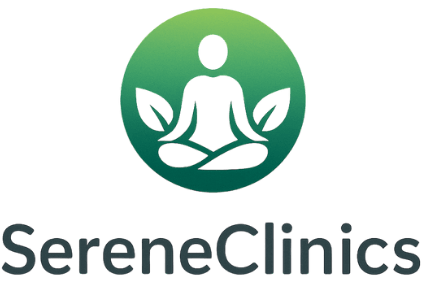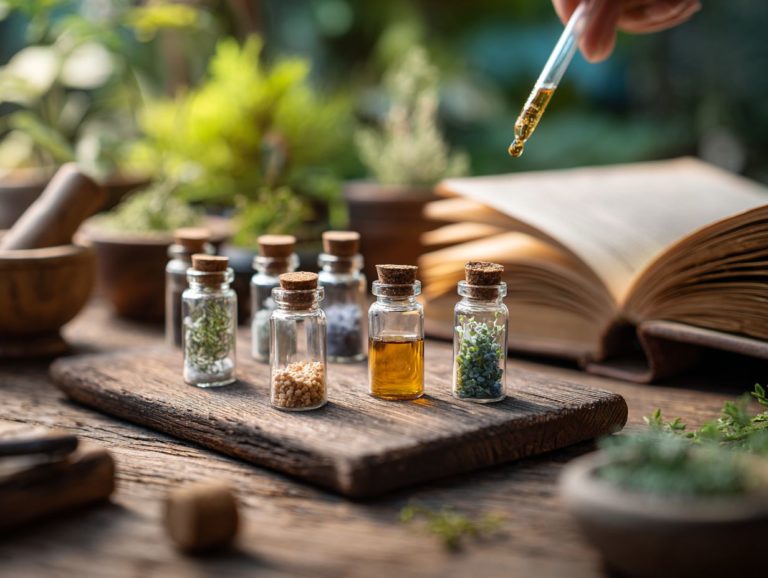Homeopathic Remedies: Sources and Preparation
Homeopathic remedies have become more common as a natural way to improve health, using ideas from different places like plants, minerals, and animals.
Understanding how these remedies are prepared through processes like dilution and potentization is important for those thinking about using them.
While they offer benefits such as personalization and non-toxicity, it’s also important to be aware of potential risks.
This article guides you through the sources, preparation methods, benefits, and considerations for choosing the right homeopathic remedy for your needs.
Key Takeaways:
Contents
- 1 What Are the Different Sources of Homeopathic Remedies?
- 2 How Are Homeopathic Remedies Prepared?
- 3 What Are the Benefits of Homeopathic Remedies?
- 4 Global Homeopathy Market Overview
- 5 What Are the Risks of Using Homeopathic Remedies?
- 6 How to Choose the Right Homeopathic Remedy?
- 7 Frequently Asked Questions
- 7.1 What are homeopathic remedies and where do they come from?
- 7.2 What are the most commonly used sources for homeopathic remedies?
- 7.3 How are homeopathic remedies prepared?
- 7.4 Can I make my own homeopathic remedies at home?
- 7.5 Are homeopathic remedies safe to use?
- 7.6 How do I choose the right homeopathic remedy for my condition?
What Are the Different Sources of Homeopathic Remedies?
Homeopathy is a type of alternative medicine created by Samuel Hahnemann in the 1800s. It uses different natural ingredients like plants, minerals, and animal products for its treatments. For those interested in the history of this practice, Drexel University’s Legacy Center offers a detailed look at the development of homeopathic medicine in the United States during the 19th century.
These ingredients are essential in creating homeopathic medicines, which are thought to trigger the body’s own healing processes and help treat different health issues. One hidden gem worth exploring is the role of licensed naturopathic doctors and their unique education and regulatory standards, which parallel the integrative approach of homeopathy.
1. Plants
Plants serve as one of the primary sources for homeopathic remedies, providing various extracts and compounds that are believed to aid in natural healing.
With many plant choices available, echinacea stands out as one often used to strengthen the immune system, especially during flu season.
Arnica montana is well-known for decreasing swelling, making it a common choice for treating bruises and sore muscles.
Scientific studies have suggested that these plant-based remedies can effectively complement conventional treatments, emphasizing their potential in addressing health conditions like respiratory infections and soft tissue injuries.
This approach aligns seamlessly with the principles of individualized treatment in homeopathy, where each remedy is selected based on the specific characteristics and needs of the patient, as highlighted by a systematic review on ResearchGate.
2. Minerals
Minerals are important in homeopathic treatments and provide many health benefits.
These natural materials come from the earth and can be carefully prepared to keep their strength and healing effects.
Homeopathy often uses minerals like Sulphur, Calcarea, and Natrum Muriaticum to address various health issues. For instance, Sulphur is often employed to address skin issues, while Calcarea is beneficial for bone health.
The preparation of these remedies involves a process of serial dilution and succussion, enhancing their efficacy while minimizing toxicity. Clinical trials have studied how well these mineral treatments work, showing their part in dealing with long-term illnesses and supporting complete healing methods. Notably, the RAND Corporation has reported on the state of homeopathic research, providing a comprehensive overview of how these approaches are integrated into modern healthcare.
Homeopathic treatment is special because it uses careful preparation and the idea that similar things can heal.
3. Animals
Homeopathic remedies use ingredients from animals, showing a wide range of methods in alternative medicine.
These derivatives can include substances such as Graphites, which is derived from the body of the graphite mineral, and Apis Mellifica, derived from honeybees.
Their preparation often involves a careful method known as potentization, where animal substances are diluted and shaken to make their healing properties stronger. These remedies are geared towards treating a variety of health conditions, from skin ailments to allergic reactions.
Important individuals such as Samuel Hahnemann, who started homeopathy, have been key in promoting the use of these ingredients, showing how they can be effective.
Recent studies, though not extensive, have tried to verify these benefits, providing information that could support the methods developed by Hahnemann and his peers.
How Are Homeopathic Remedies Prepared?
Creating homeopathic treatments involves three main steps: diluting, shaking, and strengthening. These steps are important for creating treatments in homeopathy.
This detailed method tries to improve the treatment effects of the remedies while following the rules set by Samuel Hahnemann in the 1800s.
1. Dilution Process
The dilution process is a foundational technique in homeopathy that significantly reduces the concentration of the original substance while retaining its healing properties.
This unique method involves repeatedly mixing a chosen substance with water or alcohol and shaking it vigorously, known as succussion. Homeopaths think that this physical process strengthens the energy pattern of the original substance, even though there are no molecules from the original material left.
This method is important in both its usual uses and in how it relates to the idea of the placebo effect. Some research indicates that people who undergo homeopathic treatments might have improved health because they believe in the treatment, which can lead to a positive reaction from the immune system and potentially improve overall health.
Research indicates that when patients are interested and optimistic about their treatments, they often have better symptom relief and recover faster.
2. Succussion Process
The shaking process involves strongly shaking the diluted solution, thought to increase the effects claimed by homeopathic treatments.
This method, rooted in the practices established in the late 18th century by Samuel Hahnemann, is thought to facilitate the transfer of energy from the solvent to the active ingredient, thereby activating the remedy’s latent healing properties.
Homeopaths think that shaking the solution alters its molecules, increasing its strength, but scientists question these beliefs.
While some studies suggest the possibility of altered water memory in highly diluted solutions, definitive evidence supporting succussion’s role in treatment effectiveness remains scarce.
However, the principle shows a mix of old techniques and new scientific research.
3. Potentization Process
Potentization in homeopathy is a process where treatments are made by diluting them and shaking them well, intending to improve their healing power.
This method, created in the 18th century by Samuel Hahnemann, is a way to make remedies and a key part of homeopathic medicine.
It operates on the premise that substances can become more effective as they are diluted and vigorously shaken, thereby imprinting their unique energies onto the solvent. In the past, this method has attracted both interest and doubt because its ideas go against traditional scientific beliefs.
Despite this, many recent studies are starting to look into its effects on long-term illnesses, showing significant outcomes in reducing personal symptoms. These studies try to understand potentization and give stronger support for its healing benefits in today’s medical field.
What Are the Benefits of Homeopathic Remedies?
Homeopathic treatments have many benefits, like using natural and safe ingredients. They provide care suited to an individual’s specific health problems and symptoms.
This approach has made homeopathy a common option for many people looking for effective solutions without the side effects of regular medical treatments.
Global Homeopathy Market Overview
Global Homeopathy Market Overview
Market Growth Metrics: Global Market Size
U.S. Market Data: U.S. Market Size
The Global Homeopathy Market Overview provides detailed information about the strong increase in homeopathy’s international and U.S. markets. As alternative medicine gains popularity, these statistics reflect increasing acceptance and demand for homeopathic treatments worldwide.
Market Growth Metrics highlight the global market’s significant expansion from $9.63 billion in 2024 to $26.01 billion by 2032. This growth indicates an average yearly increase that highlights the growing interest in natural and overall healthcare solutions. Factors contributing to this surge include increased awareness, consumer preference for non-invasive treatments, and supportive regulatory environments in various regions.
- U.S. Market Data: In the United States, the homeopathy market is projected to grow from $2.7 billion in 2024 to $6.8 billion by 2035. This growth shows a strong rate of increase and suggests more American consumers are adopting it. The U.S. market’s growth can be attributed to rising healthcare costs, an increasing number of chronic diseases, and a shift towards preventive care methods.
Both sets of data show homeopathy’s changing role in global healthcare. The substantial growth in both global and U.S. markets suggests that more consumers are exploring homeopathy as a complementary or alternative option to conventional medicine. This trend is likely supported by increasing research and validation of homeopathic practices, further driving its credibility and integration into mainstream healthcare.
The Global Homeopathy Market Overview Shows a hopeful outlook for homeopathy, highlighting a growing interest in non-traditional medicine and overall health approaches. As these markets grow, stakeholders can expect more money, research, and development opportunities, strengthening homeopathy’s role in global wellness.
1. Natural and Non-Toxic
People often appreciate homeopathic remedies because they are natural and non-toxic. This makes them a good choice for those worried about the side effects of regular medicine.
Focusing on the body’s natural ability to heal is appealing to people looking for complete approaches to health care.
People find these remedies attractive because they are mild and supported by many studies that confirm their safety and effectiveness for treating different conditions.
Research indicates that homeopathic treatments can effectively aid in managing allergies, respiratory issues, and even chronic pain, providing relief without the harsh impacts often associated with traditional pharmaceuticals.
As more individuals turn towards natural solutions, the urgency for scientifically-backed evidence of homeopathy’s benefits continues to grow.
2. Personalized Treatment
One of the main advantages of homeopathic remedies is their focus on customized treatment, designed to address the specific health needs of each person.
The consultation process in homeopathy starts with a detailed evaluation, where practitioners have a thorough conversation with the patient. During this conversation, homeopaths pay close attention to subjective symptoms, such as emotional states, lifestyle choices, and physical sensations, which vary greatly from one person to another.
This detailed review is important because it helps homeopaths create specific treatment plans that focus on the symptoms and consider the patient’s overall health.
Research shows that individual homeopathic treatments can produce better health results and increase patient satisfaction.
3. Holistic Approach
Homeopathy looks at the entire person, not just the symptoms, offering effective treatment for long-term illnesses and improving general health.
This approach considers the person’s feelings, thoughts, and physical condition to create a treatment plan that suits them better. Unlike conventional care that often focuses only on treating specific symptoms with medication, homeopathy works to trigger the body’s natural healing abilities.
Many studies, including trials with placebos and detailed reviews, have shown this method may help with long-term illnesses like asthma and arthritis. By treating the root causes, homeopathy helps relieve symptoms and improves the health and life quality of patients.
What Are the Risks of Using Homeopathic Remedies?
Even though many people use homeopathic treatments, they can be risky. The main concerns are that there’s not enough scientific proof they work, they can interact harmfully with other treatments, and they might lead to wrong diagnoses, delaying proper treatment for serious illnesses. For those interested in understanding more about the foundation and evidence behind these methods, our deep dive into homeopathy principles and practices offers a comprehensive view.
1. Lack of Scientific Evidence
A major issue with homeopathy is the absence of scientific proof for its effectiveness. Many critics highlight the necessity for thorough examination through well-controlled clinical trials.
Despite the long-standing history of homeopathic practices, the debate around its therapeutic claims remains contentious. Reviews that follow a clear method are important for gathering research results and pointing out differences in existing studies.
While some individual trials suggest potential benefits, many are unable to meet the stringent standards of scientific rigor necessary to establish their reliability. Placebo-controlled trials are very important in the ongoing debate about how well something works. They help show if the effects are real or just from people’s expectations.
Consequently, skeptics advocate for more transparent research methodologies to gauge the true effectiveness of homeopathic remedies.
2. Potential for Harmful Interactions
Homeopathic remedies can sometimes lead to harmful interactions when combined with conventional care, posing health risks to patients if not properly managed.
This issue highlights the critical need for medical practitioners to be fully informed about their patients’ use of homeopathic treatments. When healthcare providers are unaware of such practices, they may inadvertently prescribe treatments or medications that could have adverse effects when interacting with these remedies.
Potential side effects and reduced efficacy of critical drugs are serious concerns, and open communication about all forms of treatment is essential.
By collaborating, healthcare providers can deliver safer and more effective care, ensuring that each patient’s treatment plan is complete and secure.
3. Misdiagnosis and Delayed Treatment
The reliance on homeopathic remedies without proper medical consultation can result in misdiagnosis and delayed treatment of serious health conditions.
This habit might cause people to ignore important signs that could point to a more serious health problem, eventually putting their well-being in danger.
Without the guidance of trained professionals, patients may find themselves experimenting with various homeopathic treatments that are not suited for their specific ailments.
In many cases, the substitution of conventional medical advice for self-treatment can cause conditions to worsen, as necessary medical interventions are postponed.
Talking with knowledgeable homeopaths is very important; their knowledge makes sure that any treatment plan includes both homeopathic and regular health care methods.
Ignoring this step could result in significant negative health outcomes.
How to Choose the Right Homeopathic Remedy?
Picking the right homeopathic remedy needs careful thought and often means talking to a trained homeopath. They can look at your symptoms and personal details to make sure the treatment fits your health needs. For a deeper understanding of how homeopathy works, check out our guide on Homeopathy: Principles, Practices, and Evidence-Based Integration.
1. Consult with a Homeopath
Talking to a qualified homeopath is important for choosing the right homeopathic remedy. They have the knowledge to make a treatment plan that fits your specific symptoms and health history.
This expert advice is very important because homeopathy relies on knowing each person’s unique experiences and responses.
In a consultation, people will discuss their physical, emotional, and mental health in detail, enabling the homeopath to fully comprehend their condition. Homeopaths pay close attention to personal experiences and symptoms to create treatments that handle specific problems and support the person’s overall health.
This teamwork creates a treatment plan specifically for each person, which makes successful results more likely.
2. Research the Remedy
It’s important to research a particular homeopathic remedy before choosing it. This helps you learn about its use, how well it works, and what health issues it can treat.
With this information, people can better understand their treatment choices and make decisions that fit their specific health needs.
Looking into different homeopathic remedies encourages people to learn about their history, seeing how these treatments have been used over time and their importance in different cultures.
Examining clinical trials and thorough studies that evaluate the effectiveness of these remedies can increase knowledge and confidence in their choices.
Examining all parts results in a clearer view of health care, helping individuals weigh the benefits and drawbacks of each option.
3. Consider the Symptoms and Individual Factors
When picking a homeopathic treatment, look at your symptoms and personal details. These aspects help find the right treatment for your health needs.
Considering an individual’s lifestyle, emotions, and existing health issues helps create a treatment plan specific to them.
For instance, someone with chronic stress may present symptoms differently than another with similar ailments, necessitating an individualized assessment.
Tools like symptom checklists and lifestyle surveys can help practitioners find the right treatments for a person’s specific needs.
Examining someone’s medical records can show key trends that help doctors make treatment choices, offering a clear view of their health past.
4. Start with Low Potency
Starting with low potency homeopathic remedies is often recommended for those new to homeopathy, allowing the body to gradually engage its healing response without overwhelming it.
Going slowly is important to see how a person responds to the treatment, as it helps identify their individual sensitivities and needs.
Starting with lower strengths lets the practitioner closely monitor health changes to confirm that the remedies are helping progress rather than slowing it down.
Since people can respond differently to these treatments, changing the strength to match their particular responses is important. These personalized changes help with recovery, making sure patients get the best and most gentle care according to their specific needs.
Frequently Asked Questions
What are homeopathic remedies and where do they come from?
Homeopathic remedies are natural medicines derived from plant, animal, and mineral sources. These ingredients are diluted and potentized through a special process to create a safe and effective remedy.
What are the most commonly used sources for homeopathic remedies?
The most commonly used sources for homeopathic remedies include plants, such as arnica and chamomile, animals like bees and snakes, and minerals like sulfur and calcium carbonate.
How are homeopathic remedies prepared?
Homeopathic remedies are prepared through a process called potentization, in which the original substance is diluted and succussed (shaken vigorously) to increase its healing properties and reduce any potential toxicity.
Can I make my own homeopathic remedies at home?
It is not recommended to make homeopathic remedies at home as the potentization process requires specialized equipment and knowledge. It is best to purchase professionally prepared remedies from a reputable source.
Are homeopathic remedies safe to use?
When used as directed, homeopathic remedies are generally considered safe with minimal risk of side effects. It’s wise to talk to a certified homeopath or healthcare provider before using these remedies, particularly if you are pregnant, breastfeeding, or dealing with a long-term health issue.
How do I choose the right homeopathic remedy for my condition?
Homeopathic remedies are chosen based on the principle of “like cures like”, meaning a substance that can cause symptoms in a healthy person can also help alleviate those same symptoms in a sick person. It is best to consult with a qualified homeopath who can determine the best remedy for your specific condition.

Sheetal Sharda has a background in CS. She got an interest in Holistic living back in 2018, and has since started exploring more into Naturapathy, Holistic Living, Yoga, and more. She got inspired to start SereneClinics to help people find reliable centers across the world.






